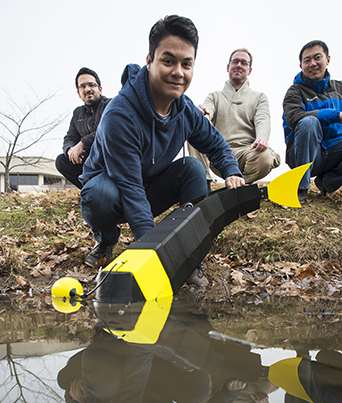
Sergio Cruz, a computer engineering major, helped create a working robot fish for his senior research project. Photo by Lathan Goumas.
Sergio Cruz admitted that the construction of a robot fish was not his first choice for a senior research project. Constructing a drone, for example, seemed a lot more interesting.
But after Cruz and his team finished their four-foot, 17-pound robot and wirelessly commanded it to swim around nearby Lake Braddock, the George Mason University senior had to admit the accomplishment was “pretty awesome.”
“Everyone,” the computer engineering major said, “wants to talk about it.”
Cruz, who is graduating Dec. 20, worked on the robot’s wireless communication—which works from a laptop, phone or tablet—as well as its graphical user interface, which allowed the team to see transmissions from the camera embedded in the robot’s nose. The robot also had sensors to relay the environmental conditions it encountered.
Cruz, an Ashburn, Virginia, resident, said the project pushed his boundaries in software development, which will make him more marketable in his postgraduate job search.
“He doesn’t talk much, but he is very motivated,” assistant professor and project supervisor Feitian Zhang said of Cruz, who came to Mason after two years at Northern Virginia Community College. “I don’t have to give him a lot of detailed instructions.”

Sergio Cruz shows off the robotic fish they nicknamed Bumblebee and Goldilocks. Photo by Evan Cantwell.
Zhang, whose research interests include bioinspired robotics, proposed the project to Cruz’s team, which also included fellow computer engineering majors Blazej Horyza and Morteza Eskandari.
The robot’s body was 3-D printed with plastic polylactic acid, and the electronics were housed in a waterproof polycarbonate enclosure. Nicknamed “Bumblebee” and “Goldilocks,” the black and yellow robot used three battery-powered motors to “swim” on the water’s surface and below.
The robot received wireless commands from the team from as far away as 300 yards, as long as there were no obstructions, which was a credit to Cruz’s work, Zhang said.
“I wouldn’t say this was an easy project,” Zhang said. “For this team, the robot was definitely a success.”
“I’ve always been interested in technology,” said Cruz, who is the first college graduate from his immediate family and whose sister, Katherine, is a junior majoring in biology at Mason. “It was from high school when one of my teachers convinced me to take a programming class. From then on, it was something I wanted to do.”
